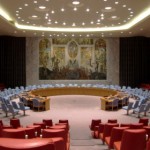A day before the 70th session of the United Nations started on 15 September, the General Assembly (UNGA) adopted a resolution calling for reform of the Security Council (SC). The UNGA has taken such a step for the first time, which makes it important in the long-running saga of calls for changes to the SC. However, the significance of this move must not be exaggerated, since the power to decide rests with the existing permanent members—China, France, Russia, the UK, and U.S.
The disappointment with the UN’s long-standing inability to carry out reforms may have contributed to Prime Minister Narendra Modi’s decision to not address the UNGA during his visit to the U.S. this week.
But the need to reform the UNSC is now more urgent than ever. Seventy years after the UN was established, grave challenges are spreading across the globe—including the growth of extremist groups, a burgeoning refugee crisis, and a lack of consensus on longer-term critical issues such as climate change and sustainable development. The United Nations is unable to deal with these challenges, because the UNSC remains trapped in post Cold War east-west rivalries.
If at all the UN has succeeded, it’s primarily in the social sphere. Its affiliate organisations, such as UNDP, WHO, and UNICEF, have helped developing countries that are trying to meet the millennium development goals in the areas of child nutrition, maternal mortality, and education. And the UNHCR valiantly struggles to address the needs of 60 million forcibly displaced persons across the globe.
However, the most important functions for which the UN was established—issues of war and peace—have been less successfully addressed. These have ranged from the failure of the UNSC to end decades-long wars in African countries such as the Sudan and the Congo, prevent U.S.-led “coalitions of like-minded countries” from invading others like Afghanistan and Iraq, to the misuse of UNSC resolutions by NATO to bomb Libya, and recently the failure to curb various countries from a conducting a proxy civil war in Syria.
Some of the shortfalls of the UNSC also came from the Cold War rivalry between the U.S. and the USSR. This paralysed its functioning until the dissolution of the Soviet Union in 1991. More recently, the failures flowed out of the disregard of the UNSC by the U.S. and Russia, both in pursuit of their own geopolitical interests even as they claim to wage wars on non-state actors to combat Islamist terrorism.
So how can the UN be made more effective? That will require the G4 to have permanent seats at the UNSC—India, along with Brazil, Germany, and Japan. This will enable the SC to better reflect the geopolitical realities of a post-colonial world, the vastly enlarged membership of the UN, and the increased economic weight of developing economies. The inclusion of the G4 in the UNSC can bring to this powerful forum diverse political and economic experiences, and make the SC more relevant in the current global situation.
However, at present, Europe, with has only 12% of the world’s population, holds 40% of the permanent seats at the UNSC.
The case for the G4 is much stronger: Germany is the largest economy in Europe and more suited for the SC than militarily and economically exhausted France and UK. Brazil and India are the seventh and ninth largest economies in the world in nominal terms. Both countries contribute to global economic peace through participation in UN peacekeeping efforts. Japan remains the third largest economy in the world, is a major contributor to the budgets of UN bodies, and is a generous aid giver to Asian and African countries.
With the continually changing geopolitical and geoeconomic dynamics, it is now imperative to construct a UNSC with inbuilt flexibilities to adapt to a more rapidly evolving world. Reform of the UNSC should therefore, along with permanent seats for the G4, provide a seat for representation from Africa and maybe even for an Arab nation. The locus of global conflicts has gravitated towards those geographies, and their economic potential too has begun to be recognised more widely.
It is the failures of institutions such as the UNSC (as well as the International Monetary Fund and the World Bank) that have paved way for the emergence of alternative entities such as “coalitions of like-minded countries” to address political problems. It has also led to the formation of institutions like the New Development Bank and the Asia Infrastructure Investment Bank in the economic governance sphere.
For now, these new multilateral institutions are more complementary than competitive with existing arrangements. But over time they could supersede the existing institutions unless the old order adapts to the new political and economic realities. But the steps now being taken, such as the recent resolution at the UNGA for reform of the UNSC may be a case of too little too late.
Neelam Deo is Co-founder and Director, Gateway House: Indian Council on Global Relations; She has been the Indian Ambassador to Denmark and Ivory Coast; and former Consul General in New York.
This article was exclusively written for Gateway House: Indian Council on Global Relations. You can read more exclusive content here.
For interview requests with the author, or for permission to republish, please contact outreach@gatewayhouse.in.
© Copyright 2015 Gateway House: Indian Council on Global Relations. All rights reserved. Any unauthorized copying or reproduction is strictly prohibited.


